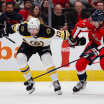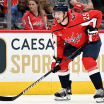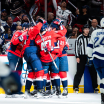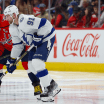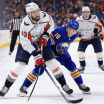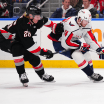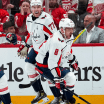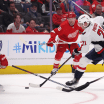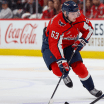Keep The Home Fires Burnin' - Home ice advantage hasn't always been fruitful for recent vintage Caps teams in the playoffs. Prior to this spring, Washington lost Game 1 in three of the last four series in which it held home ice advantage, and it needed overtime to get the one victory it did manage.
SKATE SHAVINGS - News and Notes from Caps' Morning Skate 4/13
Caps look to protect home ice in Game 2, get fourth line more ice time, break the Canes' forecheck, more
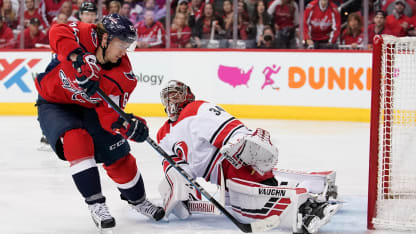
One of the earmarks of great teams in any sport is the ability to win games on nights when the team is not quite operating at the level of its collective capacity, and so it went for Washington in Game 1 of this Eastern Conference quarterfinal series with Carolina. The Caps started slowly, scored three goals in the back half of the first period, and then held on for a 4-2 win, aided by a last-minute empty-net goal.
Washington was mediocre at five-on-five, but special teams pulled the Caps through. They scored two power-play goals in the first period and killed off two Carolina power plays in the second half of the third period. But they know they can play better, and they know they'll have to if they hope to maintain that home ice advantage when the series shifts to Raleigh for Game 3 on Monday.
Early in the first round of the 2019 Stanley Cup playoffs, the New York Islanders are the only team that has maintained its home ice advantage through the first two games of the series, though the Caps and the Calgary Flames have the opportunity to join them in that distinction today.
Upside Down - During Washington's 24-game run to the Stanley Cup championship last spring, it received a healthy and consistent dose of secondary scoring throughout. The Caps' bottom six forwards combined to supply 27 goals in those 24 contests, with a dozen of those coming from the team's fourth line.
In Thursday's series opener, the Caps' fourth line was arguably its best forward unit - particularly at five-on-five - but the trio of Andre Burakovsky, Nic Dowd and Chandler Stephenson was sparingly deployed in Game 1, mostly due to a few clusters of special teams activity early and late in that contest.
Washington's top players were responsible for generating each of the three goals the team scored in the first period of Game 1, and two of those tallies came on the power play. But once those three goals had been scored, it was radio silence from the top six.
From the time Alex Ovechkin scored to make it a 3-0 game at 18:05 of the first period through the final horn - a total of 41:55 of game time - the Caps didn't get a single shot on net from a top six forward.
In a perfect world, the Caps would be able to get their fourth line on the ice a bit more in Game 2.
Todd Reirden | April 12
"Yeah, definitely," says Caps coach Todd Reirden. "When we look at certain shifts of the game that we liked and that were most similar to how we would like Capitals hockey to look, they were involved in them. We have to shorten our line shift length a little bit, so that can allow them to get out there in certain match-ups I'd like to have them out there in. So that's something we can do better. After looking at the game, our shift length can be shorter, and it will allow us to utilize everybody a little bit more."
Forecheck, Please - Referring back to the above item, one reason for the longer shifts the Caps were taking was the effectiveness of the Carolina forecheck. The Canes' defensemen pinched aggressively up the walls and made it extremely difficult for the Caps to break pucks out of their end cleanly and efficiently, and Washington occasionally found itself hemmed in its end for extended stretches of time.
The Caps defended well during those rocky patches, protecting the middle of the ice, but the time spent defending and reacting drains the collective energy stores much more quickly, and that can be problematic for Washington, which will be playing without top four defenseman Michal Kempny (lower body) for the duration of the playoffs.
"We knew that they were a high shot volume team," says Caps defenseman Nick Jensen. "But I think we did a pretty good job of taking away sticks in front, and those second rebounds, those second chances is what they want, and that's how they score. They get pucks to the net, and then everyone is scrambling and then they get those back door tap-ins.
"So I think we did a good job of protecting those second chances that they had. You look at the shots and they outshot us, but I think we did a good job with those secondary chances.
Caps goalie Braden Holtby faced a reasonable workload of 29 shots, but Carolina generated 69 shots attempts in the game. Twenty-three of those tries missed the mark, and the Caps blocked 17 of them. But Holtby has to react to all of those shots, too, and that takes a toll over 60 minutes.
Starting with Game 2, the Caps need to be quicker and more efficient with their zone exits, and they need to make better puck decisions in the offensive zone, which will ideally lead to more sustained time in the offensive zone, an element that was severely lacking in Thursday's opener.
Washington can use the aggressive mindset of the Carolina defense against the Hurricanes if it can win some of those wall battles on which the Canes' defensemen are pinching up. The Caps' bottom six forwards were able to do that in the first five minutes of the third period of Game 1.
"It's going to be a lot on our wingers and their wall play," says Jensen. "They did a pretty good job of it [Thursday], and they're going to have to keep doing a good job of it because [the Canes] come with such pressure that it's going to be hard to go tape-to-tape the whole time getting out of the zone. We know their [defensemen] are coming down the walls pretty hard too, so we've got to find ways to get it around those guys. That can be advantageous to us, too. With their [defensemen] diving down the wall, it can turn to odd-man rushes [for us]."
Two-Man Advantage | April 13
In The Nets - Holtby will be back in net for Washington in Game 2. He stopped 27 of 29 shots in Game 1 to improve his career playoff record to 46-37, and tying him with Jonathan Quick for fourth in playoff wins among active goaltenders; only Marc-Andre Fleury (76), Henrik Lundqvist (61) and Corey Crawford (48) have more. Holtby has allowed two or fewer goals against in six of his last eight starts in the playoffs.
We're expecting to see Petr Mrazek in goal for the Hurricanes on Saturday. He yielded three first-period goals in Game 1 before shutting the door the rest of the way and finishing with 14 saves. Mrazek made a quartet of strong stops in the first five minutes of the third period, keeping the Canes within striking distance. That proved to be critical, as they got on the board for the first time a mere 10 seconds after the last of those aforementioned saves.
Between that save on Lars Eller at 4:57 of the third and Eller's empty-net goal with 36.6 seconds left in regulation, the Caps were held without a shot on goal for 14 minutes and 23 seconds.
The 27-year-old Mrazek is now 1-5 in his last seven postseason appearances (six starts), despite yielding just a dozen goals in those six starts.
All Lined Up -Here's how we expect the Caps and the Hurricanes to look when they meet on Saturday afternoon in the District for Game 2 of their first-round Stanley Cup playoff series:
WASHINGTON
Forwards
8-Ovechkin, 19-Backstrom, 43-Wilson
62-Hagelin, 92-Kuznetsov, 77-Oshie
13-Vrana, 20-Eller, 10-Connolly
65-Burakovsky 26-Dowd, 18-Stephenson
Defensemen
9-Orlov, 2-Niskanen
74-Carlson, 3-Jensen
44-Orpik, 29-Djoos
Goaltenders
70-Holtby
1-Copley
Injuries
6-Kempny (lower body)
Scratches
23-Jaskin
34-Siegenthaler
72-Boyd
CAROLINA
Forwards
21-Niederreiter, 20-Aho, 14-Williams
79-Ferland, 11-Staal, 86-Teravainen
37-Svechnikov, 48-Martinook, 23-McGinn
13-Foegele, 71-Wallmark, 8-Maenalanen
Defensemen
74-Slavin, 19-Hamilton
22-Pesce, 27-Faulk
4-Fleury, 57-van Riemsdyk
Goaltenders
34-Mrazek
35-McElhinney
Injuries
44-de Haan (wrist)
Scratches
24-Bean
42-McKegg



